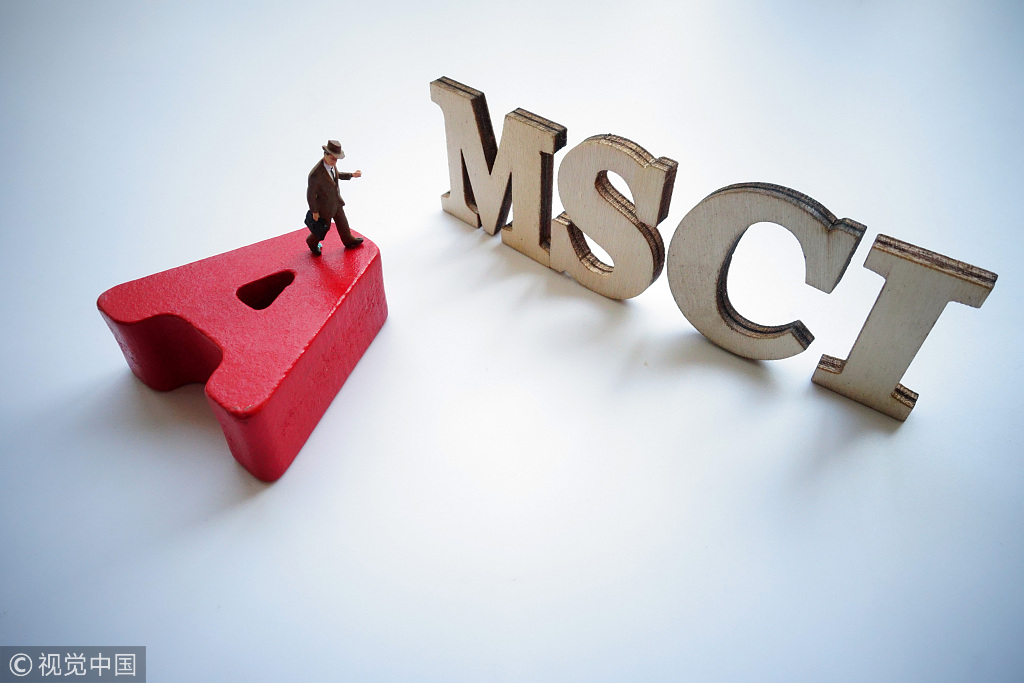
Opinion
21:34, 01-Mar-2019
A-shares weighting increase in MSCI benchmarks expands accessibility to 'China Opportunity'
David Lee

Editor's Note: David Lee is a consultant and author based in Beijing who works on cross-cutting themes of energy, health, international politics, and international development. The article reflects the author's opinion, and not necessarily the views of CGTN.
Since the early 1980s, rising China has generated huge economic gains for those strategic-thinking overseas who came to benefit from the "China Opportunity." Until recently, the China Opportunity hasn't been readily available in the stock market. Now things are starting to change, for real.
Following the groundbreaking inclusion of 226 China large-cap A-shares in the MSCI Emerging Markets Index in May 2018, a three-step plan has been announced this week by MSCI to finally quadruple the weighting of China A-shares in its indexes, from the current five percent to 20 percent in the coming months.

The MSCI is quadrupling the weighting of China A-shares in its global benchmarks. /VCG Photo
The MSCI is quadrupling the weighting of China A-shares in its global benchmarks. /VCG Photo
Reuters reports that, at the completion of the three-step implementation, the MSCI Emerging Markets Index will include 253 large-cap and 168 mid-cap China A-shares. In addition, rivals FTSE Russell and S&P Dow Jones Indices will both start adding yuan-denominated Chinese shares to their global benchmarks this year.
Unmistakably, MSCI's latest announcement opens up expanded accessibility for keen overseas investors to ride on the waves of the Chinese mainland's stock market. It must be noted, though, China's equity market accounts for nearly 30 percent of the emerging markets, and even with the planned quadruple increase, the weighting of Chinese stocks in the MSCI Emerging Market Index remains low at 3.3 percent, compared with the current 0.7 percent.
Therefore, the long journey must continue and tons of work must be done before a robust Chinese stock market can be seamlessly integrated and function well as part of the global financial system.
When it comes to stock market opening-up, China has pursued the art of cautious incrementality. China opened its A-shares to overseas investors by launching Qualified Foreign Institutional Investors (QFII) and Renminbi Qualified Foreign Institutional Investor (RQFII) programs in 2002 and 2011 respectively.
China also initiated the Shanghai-Hong Kong and Shenzhen-Hong Kong Stock Connect programs in 2014 and 2016 respectively. These major milestones accompanied the steady progress towards wider accessibility, despite concerns about specific investment rules or alleged market irregularities now and then.

The MSCI is quadrupling the weighting of China A-shares in its global benchmarks. /VCG Photo
The MSCI is quadrupling the weighting of China A-shares in its global benchmarks. /VCG Photo
According to MSCI, the decision to increase the weighting of Chinese stocks followed extensive global consultation with international institutional investors. The proposal, indeed, has garnered overwhelming support from global investors. Such positive sentiment is a sure indication of the eagerness to embrace the China Opportunity, now available in a relatively new dimension that is the stock market.
Opening up wider accessibility to overseas investors is mutually beneficial. Reuters reports MSCI's announcement could potentially draw more than 80 billion U.S. dollars of fresh foreign inflows to China.
With signs pointing to easing trade war tensions between the world's two biggest economies, China's stock market rose significantly during February. Furthermore, when news of the MSCI announcement greeted local investors on the first trading day in March, China's benchmark Shanghai Composite Index rose 1.80 percent, accompanied by its Shenzhen index rising 1.50 percent.
Following a dreary trajectory over the past year and overall lackluster performance for quite some time, China's stock market does need some good news to boost confidence and morale. As China deepens its reform and cultivates a healthier market, wider accessibility to overseas investors is only the sure thing to happen, which in turn will benefit both China and the world.
(If you want to contribute and have specific expertise, please contact us at opinions@cgtn.com.)

SITEMAP
Copyright © 2018 CGTN. Beijing ICP prepared NO.16065310-3
Copyright © 2018 CGTN. Beijing ICP prepared NO.16065310-3